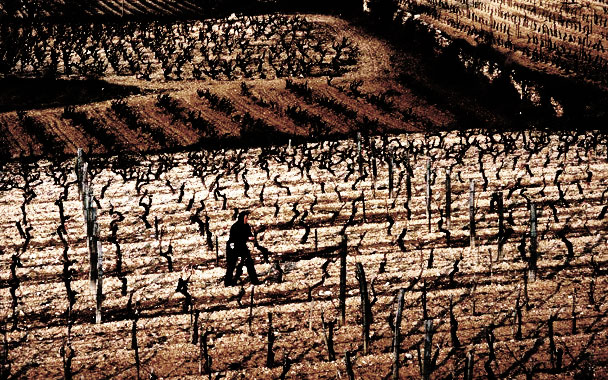Can a direct appeal to our palates succeed where pleas to intellect and conscience have repeatedly come up short? That’s the hope of a group of French chefs, sommeliers, and chateau owners who last week published an op-ed in the newspaper Le Monde calling on President Nicolas Sarkozy to ensure that strict targets on carbon emissions be adopted at the UN climate summit this December in Copenhagen. If not, they warned, the nation’s vaunted wine industry will likely go up in smoke.
“The jewels of our common cultural heritage,” wrote more than 50 wine and gastronomy professionals (including Michelin-starred chefs Jean-Luc Rabanel and Marc Veyrat), are today in serious danger. Summer heat waves, hailstorms in Bordeaux, and new diseases coming from the south are already making the nation’s vineyards more vulnerable, and as extreme conditions proliferate, they could result in the permanent destruction of the terroirs responsible for France’s “elegant and refined” wines. Warmer weather will mean higher alcohol levels, over-sunned aromatic ranges, and denser textures, said the letter, which was also signed by Greenpeace; in other words, the loss of the “unique soul” of French wines—not to mention the loss of the nation’s winemaking superiority to more northerly nations like Scotland and Sweden.
Talk of wine regions moving north as the climate warms up is nothing new: The website climatechangeandwine.com is devoted to the topic, for example, and in his Pocket Wine Book 2009, British writer Oz Clarke says that a 2-degree-Celcius rise by 2050 would dramatically alter the winemaking landscape. (“If you want to produce Burgundy-like [flavors], you’ll need to plant Pinot Noir in Holland and Belgium, maybe even on the Baltic coast.”) But in calling on “the president of the Republic and the minister of the environment of the country with the premier winegrowing culture of the world” to push for a deal at Copenhagen that will cut industrialized countries’ greenhouse gas emissions by 40 percent by 2020, the signatories of the Le Monde piece have put some real teeth behind the cause. Immediate action is imperative, they wrote, both in terms of winegrowers making their own businesses more sustainable, and of politicians making some seriously tough decisions. If nothing is done, the end of the century will see vineyards more than 1,000 kilometers (600 miles) beyond their traditional boundaries, and generations of viticulture slowly dying out. “Our future depends on you,” wrote the wine and food professionals.
Motivating people to get serious about the abstract and far-off-seeming threat of climate change has never been easy, but the idea of losing Pétrus and Latour for good could prove the slap in the face it might take. At least on that side of the Atlantic, anyway.
Here in the States, supporters of strong mitigation measures have recently hit upon a different strategy. Just three days ago, the editorial page of The New York Times lamented that though advocates of early action on climate change have talked about everything from the possibilities of green jobs and the importance of keeping America competitive in the quest for new technologies to the moral obligations of one generation to the next, none of that has been enough “to fully engage the public” on the topic (or to overcome the lobbying efforts of the fossil fuel industry). To really get Americans to pay attention (as Dick Cheney could have told you years ago), you have to frame things in terms of national security. Citing a 2007 report published by a Pentagon-funded think tank that “spoke ominously of climate change as a ‘threat multiplier’ that could lead to wide conflict over resources,” the Times wrote that “[c]limate-induced crises like drought, starvation, diseases, and mass migration could unleash regional conflicts and draw in America’s armed forces, either to help keep the peace or to defend allies or supply routes.”
The national security argument, pointed out the editorial, could make the difference on Capitol Hill, “where many politicians will do anything for the Pentagon.” (The climate bill narrowly passed by the House of Representatives in late June is currently up for debate in the Senate.) Both Senator John Kerry, for example, an advocate of strong climate change legislation, and former Senator John Warner, a former chairman of the Armed Services Committee, say that they’ve begun stressing national security concerns to senators who are undecided about how to vote on climate change legislation.
“National security is hardly the only reason to address global warming,” concluded the Times editorial, “but at this point anything that advances the cause is welcome.”
We’ll raise a glass of French wine to that.



 Pinterest
Pinterest


